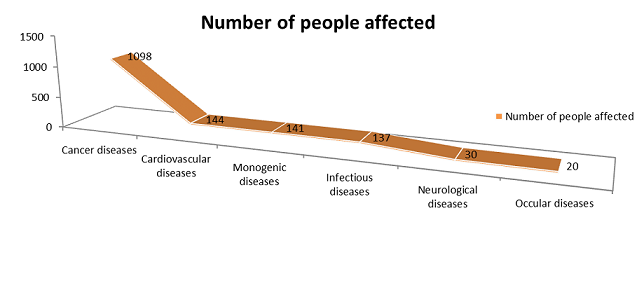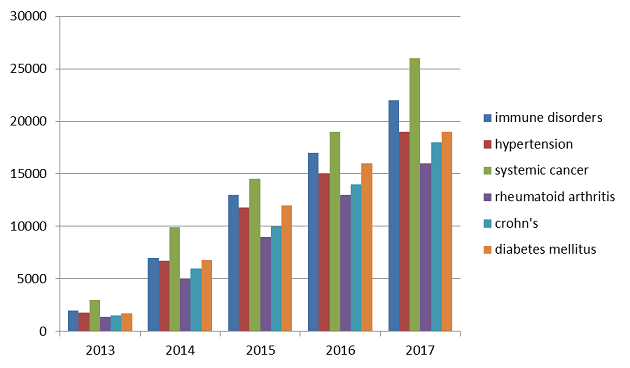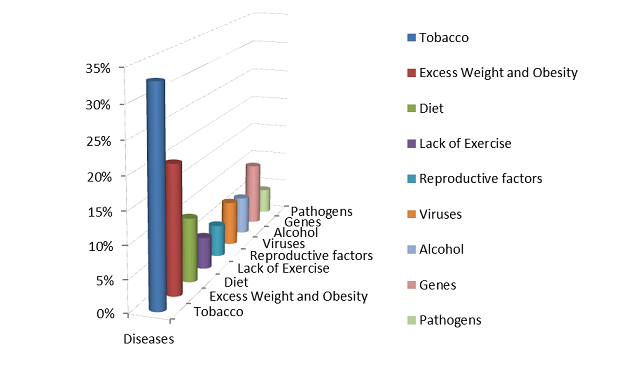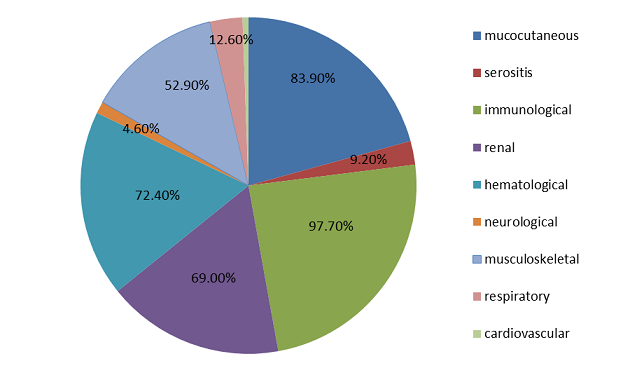Recommended Global Medical Webinars & Conferences
Europe & UK
Asia Pacific & Middle East
Canada
Systemic Conditions 2018
About Conference
ConferenceSeries LLC Ltd, welcomes all the attendees, speakers, sponsor’s and other research expertise from all over the world to the "International Conference on Systemic Conditions & Therapies” (Systemic Conditions 2018) which is going to be held during Septmber19-20,2018 in Vancouver, Canada. We are very much honored to invite you all to exchange and share your views and experience on Systemic Conditions 2018.
Systemic means affecting the entire body, rather than a single organ or body part. For example, systemic disorders, such as high blood pressure, or systemic diseases, such as the flu, affect the entire body. An infection that is in the bloodstream is called a systemic infection. An infection that affects only one body part or organ is called a localized infection. Systemic therapy neither attempts a 'treatment of causes' nor of symptoms, rather it gives living systems nudges that help them to develop new patterns together, taking on a new organizational structure that allows growth. Thus systemic therapy differs from analytic forms of therapy, including psychoanalytic or psychodynamic forms of family therapy.
We invite you to join us at the Systemic Conditions 2018, where you will be sure to have a meaningful experience with scholars from around the world. All members of the Systemic Conditions 2018 organizing committee look forward to meet you in Vancouver, Canada.
Session Tracks
Track1: Systemic disease
Systemic disease is disease that influences the entire body, instead of being confined to a body part or organ. Examples of systemic diseases include influenza and systemic lupus erythematous, a malady in which the body's immune system attacks the body itself.
The hands, being composed of many types of tissue, including veins, nerves, skin and skin-related tissues, bones, and muscles, tendons, ligaments, may demonstrate changes that reflect a disease that influences other parts of the body or even the entire body. These are known as systemic diseases. The hands may demonstrate changes noticed by the patient or his/her hand surgeon even before the disease is recognized.
Track2: Neuromuscular diseases
Neuromuscular disease is an extremely term that includes numerous diseases and ailments that debilitate the functioning of the muscles, either directly, being pathologies of the voluntary muscle, or indirectly, being pathologies of nerves or neuromuscular junctions.
Patients with neuromuscular diseases can have weakness, loss of muscle mass, muscle twitching, cramping, numbness, shivering, and a host of other symptoms. Issues with the nerve-muscle junction can also cause droopy eyelids, double vision, and weakness that exacerbate with moment. Some neuromuscular disorders can also cause difficulty with swallowing and sometimes with breathing.
Track3: Autoimmune disorders
An autoimmune disease is a condition emerging from an irregular invulnerable immune response to a normal body part. There are at least 80 types of autoimmune diseases. Nearly any body part can be involved.
Common symptoms include low grade fever and feeling tired. Regular symptoms come and go.
The cause is generally unknown. Some autoimmune diseases such as lupus keep running in families, and certain cases might be activated by infections or other ecological factors. Some common autoimmune disease incorporate.
Track4: Gout
Gout is a type of inflammatory arthritis characterized by recurrent attacks of a red, delicate, hot, and swollen joint. Pain typically comes on quickly in less than twelve hours. The joint at the base of the big toe is influenced in about half of cases.
Gout an intricate form of arthritis can affect anybody. Men are more probably to get gout, but women become progressively susceptible to gout after menopause.
An attack of gout can occur suddenly, often waking you up in the middle of the night with the impression that your big toe is ablaze. The affected joint is hot, swollen and so delicate that even the heaviness of the sheet on it may seem intolerable.
Fortunately, gout is treatable, and there are ways to reduce the risk that gout will repeat.
Track5: Liver and kidney diseases
Liver failure that leads to kidney failure is called hepatorenal syndrome. The immune system malfunctions, increasing the risk of infections. People may have metabolic abnormalities, such as a low potassium level in the blood (hypokalemia) or a low glucose level (hypoglycemia).
The liver assumes a vital part in numerous substantial capacities from protein creation and blood coagulating to cholesterol, glucose (sugar), and iron digestion.
A variety of illnesses can influence the liver,
Certain drugs like extreme measures of acetaminophen, and acetaminophen combination medications like Vicodin, Norco, and statins,
Hepatitis A, B, C, D, and E
Epstein Barr virus (infectious mononucleosis)
Non-alcoholic fatty liver disease
Iron overload (hemochromatosis)
Hepatorenal syndrome is a condition in which there is progressive kidney failure. It occurs in a person with cirrhosis of the liver. It is a genuine complication that can lead to death.
Hepatorenal syndrome occurs when the kidneys stop working well in people with serious liver issues. Less urine is expelled from the body, so waste products that contain nitrogen build up in the bloodstream (azotemia).
The disorder occurs in up to 1 in 10 people who are in the hospital with liver failure. It leads to kidney failure in people with:
Acute liver failure
Alcoholic hepatitis
Cirrhosis
Infected abdominal fluid
Track6: Blood disorders
There are many types of blood disorders which specialist doctors will treat in various ways relying upon the type and severity of the disorder. Only some people with blood disorders will need a stem cell transplant.Blood disorders can influence any part of your blood, including:
Red blood cells, which carry oxygen around your body.
White blood cells, which fight infection.
Platelets, which help blood to cluster.
Plasma, which is the fluid part of your blood.
Track7: Crohns disease
Crohns disease is a chronic inflammatory bowel disease (IBD) characterized by inflammation of the digestive, or gastrointestinal (GI) tract. In fact, Crohn’s can influence any part of the GI tract, from the mouth to the anus, but it is more commonly found at the end of the ileum. Where it joins the beginning of the colon.
Crohn's infection is a kind of fiery entrail illness. Upwards of 700,000 Americans have Crohn's sickness.
More research about this infection is vital. Specialists aren't sure how it starts, who is well on the way to create it, or how to best treat it. Notwithstanding significant advances in treatment over the most recent three decades, no cure is accessible for Crohn's sickness.
Track8: Hypertension
Hypertension (HTN or HT), also known as high blood pressure (HBP), is a long term medical condition in which the blood pressure in the arteries is determinedly raised. High blood pressure usually does not cause symptoms. Long term high blood pressure, however, is a major risk factor for
• Coronary artery disease,
• Stroke
• Heart failure
• Vision loss,
• Chronic kidney disease.
Blood pressure is the force applied by the blood against the walls of veins, and the extent of this constrain depends on the cardiac output and the resistance of the veins. Physical inactivity. A salt-rich diet associated with processed and greasy nourishments.
Track 9: Atherosclerosis
Two things that can happen where plaque happens are: Atherosclerosis is a disease in which plaque develops inside your arteries. Arteries are veins that convey oxygen-rich blood to your heart and different parts of your body.
Plaque is comprised of fat, cholesterol, calcium, and different components found in the blood. Over time, plaque solidifies and narrows your arteries. This restrains the stream of oxygen-rich blood to your organs and other parts of your body.
A bit of the plaque may break off.
A thrombus may form on the plaque's surface.
If either of these occurs and blocks the artery, a heart attack or stroke may result.
Track 10: Immunology
The science of Immunology incorporates the study of the improvement, anatomy functions and glitches of the immune system, all of which are of fundamental significance to the comprehension of human disease. The immune system is comprised of many types of molecules and cells that are dispersed in each tissue of the body, as well as specialized lymphoid organs, which act in a organised manner to prevent or eliminate microbial contaminations, to suppress the development of tumors, and to initiate repair of damaged tissues. The immune system normally perceives and responds to foreign molecules or damaged self, but not healthy host cells and tissues. The innate immune system maintains barriers to microbial intrusion and provides critical biochemical and cellular first responders to infections that are significant for survival in a world abounding with microbes.Innate immune recognition initiates stereotypical inflammatory or anti-viral reactions to a limited number of molecular patterns that are shared by variuos pathogens or communicated by harmed or infected host cells.
• Structural Immunology
• Transplantation Immunology
• Neuroimmunology
• Cancer and Tumor Immunobiology
Track11: Pathogens
A pathogen or irresistible agent is a biological agent that causes disease or illness to its host.
The term is regularly utilized for agents that disrupt the typical physiology of a multicellular animal or plant.
The human body contains many natural safeguards against some of basic pathogens in the form of the human immune system and by some "supportive" bacteria introduce in the human body's normal flora.
Today, while numerous medicinal advances have been made to defend against disease by pathogens, using inoculation, anti-infection agents and fungicide, pathogens keep on threatening human life.
Track12: Influenza
Influenza, commonly known as "the flu", is an irresistible disease caused by an influenza virus. Symptoms can be mild to severe. The most regular side effects include: a high fever, runny nose, sore throat, muscle torments, headache, coughing, and feeling tired. These indications normally start two days after exposure to the virus and most last less than a week. The cough, however, may last for more than two weeks.In children, there may be nausea and vomiting, but these are not common in adults. Sickness and vomiting occur more instantly in the unrelated infection gastroenteritis, which is sometimes inaccurately referred to as "stomach influenza" or "24-hour flu". Complications of influenza may incorporate viral pneumonia, secondary bacterial pneumonia, sinus infections, and compounding of previous health problems such as asthma or heart failure.
Track13: Diabetes mellitus
Diabetes mellitus (DM), commonly referred to as diabetes, is a group of metabolic diseases in which there are high blood sugar levels over a prolonged period. Symptoms of high blood sugar include frequent urination, increased thirst, and increased hunger. If left untreated, Diabetes can cause many complications
Type 1 Diabetes (T1D): The body stops producing insulin or produces too little insulin to regulate blood glucose level.
Type 1 diabetes affects about 10% of all people with diabetes in the United States.
Type 1 diabetes is typically diagnosed during childhood or adolescence. It used to be referred to as juvenile-onset diabetes or insulin-dependent diabetes mellitus.
Insulin deficiency can occur at any age due to destruction of the pancreas by alcohol, disease, or removal by surgery.
Type 2 Diabetes (T2D): Although the pancreas still secretes insulin, the body of someone with type 2 diabetes is partially or completely incapable of responding to insulin. This is often referred to as insulin resistance. The pancreas tries to overcome this resistance by secreting more and more insulin. People with insulin resistance develop type 2 diabetes when they fail to secrete enough insulin to cope with their body's demands.
Track 14: Genetic disorders
Genetic disorders are conditions brought on by variations from the norm in the genetic material contained inside our cells.
There are different genetic disorders that can affect the blood and bone marrow. People inherit genetic disorders or diseases through their genes. They may be diagnosed when a baby is born or the disorder can develop later in life. They include mucopolysaccharide and related diseases (MPS), Wiskott - Aldrich syndrome (this is what Anthony Nolan had), severe combined Immunodeficiency and chronic granulomatous disease. Sometimes people with these conditions will need a stem cell transplant. The charities Genetic Disorders UK have information about these conditions and also offer support to patients and their families.
There are three types of genetic disorders:
Single-gene disorders,where a mutation influences one gene. Sickle cell anemia is an illustration.
Chromosomal disorders, where chromosomes or parts are missing or changed. Chromosomes are the structures that hold our genes. Down syndrome is a chromosomal disorder.
Complex disorders, where there are mutations in two or more genes. Often your way of life and environment additionally assume a part. Colon tumor is a case.
Track 15: Inflammation and Therapies
Inflammation is the body's attempt at self-protection; the aim being to remove harmful stimuli, including damaged cells, irritants, or pathogens - and begin the healing process. In Inflammation the body's white blood cells and substances they produce protect us from infection with foreign organisms, such as bacteria and viruses. However, in some diseases, like arthritis, the body's defense system, the immune system triggers an inflammatory response when there are no foreign invaders to fight off. In these diseases, called autoimmune diseases, the body's normally protective immune system causes damage to its own tissues. The body responds as if normal tissues are infected or somehow abnormal. Inflammation involves immune cells, blood vessels, and molecular mediators. The purpose of inflammation is to eliminate the initial cause of cell injury, clear out necrotic cells and tissues damaged from the original insult and the inflammatory process, and to initiate tissue repair. Signs of acute inflammation are pain, heat, redness, swelling, and loss of function
Therapies:
Inflammation Therapy is a treatment for chronic disease involving a combination of lifestyle factors and medications designed to enable the immune system to fight the disease. Techniques used include heat therapy, cold therapy, electrical stimulation, traction, massage, and acupuncture. Heat increases blood flow and makes connective tissue more flexible. It temporarily decreases joint stiffness, pain, and muscle spasms. Heat also helps reduce inflammation and the buildup of fluid in tissues (edema). Heat therapy is used to treat inflammation (including various forms of arthritis), muscle spasm, and injuries such as sprains and strains. Cold therapy Applying cold may help numb tissues and relieve muscle spasms, pain due to injuries, and low back pain or inflammation that has recently developed. Cold may be applied using an ice bag, a cold pack, or fluids (such as ethyl chloride) that cool by evaporation. The therapist limits the time and amount of cold exposure to avoid damaging tissues and reducing body temperature (causing hypothermia). Cold is not applied to tissues with a reduced blood supply (for example, when the arteries are narrowed by peripheral arterial disease).
Track 16: Chronic fatigue syndrome
Chronic fatigue syndrome (CFS) is a disorder that causes extreme fatigue. This fatigue is not the kind of tired feeling that goes away after you rest. Instead, it lasts a long time and limits your ability to do ordinary daily activities. There is no cure for CFS, so the goal of treatment is to improve symptoms. CFS affects people in different ways. You should work with your doctors to create a treatment program that best meets your own needs. It may include therapies to manage your symptoms, such as medicines to treat pain, sleep disorders, and other problems. It may also include coping techniques, and ways of managing your daily activities.
Track17: Ocular diseases
The Ocular Disease service provides diagnosis, treatment and management of disease and anomalies that affect the human eye and visual system.
We see many ocular disease conditions and we can help you today if you have an ocular disease. Protect your eye health and your vision. Be sure to visit your Doctor of Optometry regularly.
All staff is residency-trained doctors who have completed extensive studies into the mechanisms of disease that affect the eye and their diagnosis and treatment.
Track18: Stem Cell Therapeutics and Regenerative Medicine
Stem cells can self-renew themselves and differentiate or develop into more specialized cells. They are the foundation for every organ and tissue in our body. Due to this ability of the stem cells, they have tremendous promise to help us understand and treat a wide range of diseases, injuries and other health related problems. Bone marrow transplantation is the most widely used stem cell therapy, but some of the therapies are derived from umbilical cord blood are also in use today. Likewise, blood stem cells are used to treat diseases of blood, a therapy that has saved thousands of lives of children with leukemia.
Track19: Periodontal diseases
When gingivitis is not treated, it can advance to “periodontitis” which means “inflammation around the tooth”. In periodontitis, gums pull away from the teeth and form spaces called “pockets” that become infected. The body’s immune system fights the bacteria as the plaque spreads and grows below the gum line. Bacterial toxins and the body’s natural response to infection start to break down the bone and connective tissue that hold teeth in place. If not treated, the bones, gums, and tissue that support the teeth are destroyed. The teeth may eventually become loose and have to be removed.
Track20: Human digestive system
The digestive system is made up of the gastrointestinal GI tract—also called the digestive tract—and the liver, pancreas, and gallbladder. The GI tract is a series of hollow organs joined in a long, twisting tube from the mouth to the anus. The hollow organs that make up the GI tract are the mouth, esophagus, stomach, small intestine, large intestine—which includes the rectum—and anus. Food enters the mouth and passes to the anus through the hollow organs of the GI tract. The liver, pancreas, and gallbladder are the solid organs of the digestive system. The digestive system helps the body digest food.
Track21: Cardiovascular diseases
Heart and blood vessel disease — also called heart disease — includes numerous problems, many of which are related to a process called atherosclerosis. Atherosclerosis is a condition that develops when a substance called plaque builds up in the walls of the arteries. This buildup narrows the arteries, making it harder for blood to flow through. If a blood clot forms, it can stop the blood flow. This can cause a heart attack or stroke.
A heart attack occurs when the blood flow to a part of the heart is blocked by a blood clot. If this clot cuts off the blood flow completely, the part of the heart muscle supplied by that artery begins to die. Most people survive their first heart attack and return to their normal lives to enjoy many more years of productive activity. But having a heart attack does mean you have to make some changes. The doctor will advise you of medications and lifestyle changes according to how badly the heart was damaged and what degree of heart disease caused the heart attack. Learn more about heart attack.
Market Analysis
Canada grand strategy that places an accentuation on two key factors: the ideological substance of North American radicalism and geopolitical conditions abroad. These recommendations are joined with several bits of knowledge from geopolitical theories to form a Theory of Liberal Foreign Policy (TLFP), which predicts Canada, will look for particular grand strategies under various ideological and systemic conditions. This review uses a variety of essential source records to gauge TLFP's factors and evaluate its hypothetical power.
The research in systemic conditions and therapies leads to the development of a variety of vaccines, diagnostic kits and cancer medications that are in wide use today. International Conference on Systemic Conditions & Therapies 2018. Provide a unique platform for exploiting the current active research in Immunology and relevant areas across the World. Conference series LLC Ltd is proud to organize systemic conditions and therapies 2018 during December 03-04, 2018.Vancouver, Canada. Allied academies, the world pioneer in organizing 300 International conferences in USA, Europe, Asia and other continents. Uniquely, 350 peer-reviewed open access journals were operating by Allied academies. This will reflect the scope in current research and development in science, healthcare and technology. Allied academies have been associated with more than 1000 scientific Societies and Associations.

This report provides comprehensive analysis of
• Market growth drivers
• Factors limiting market growth
• Current market trends
• Market structure
• Market projections for upcoming years
In the past couple of years, the quickly propelling field of cancer immunology has delivered several new techniques for treating cancer, called immune therapies, that expansion the quality of immune responses against tumors Immunotherapies either empower the exercises of particular segments of the immune system or counteract signals produced by cancer cells that stifle invulnerable reactions.

This report is a total investigation of current patterns in the market, industry growth drivers, and limitations. It gives advertise projections for the coming years. It incorporates investigation of recent developments in innovation; Porter’s five constrain model analysis and detailed profiles of top industry players.

Members Associated with Systemic conditions & therapies:
The common members associated with the systemic conditions and therapies are the health professionals like Physicians, Surgeons, Dentists, Physiotherapists, Nursing Professionals, Pharmacists, people working in clinical research associations, students studying life sciences. There are currently about total specialty of 19,497 physicians licensed to practice in Canada. In the last thirty years the number of physicians had tripled, yet the rate, but the rate of increase is now very slight. Indeed, since 1971, the Ministry of health has limited the number of medical students.
Hospitals associated with the Systemic conditions & therapies-2018 Conference:
• Medical-surgical hospitals
• Maternity hospitals
• Children's hospitals
• Psychiatric hospitals
• Hospitals for illnesses of the thorax
• Oncological hospitals
• Ophthalmic hospitals
• Traumatological and rehabilitation hospitals
• Psycho-physical rehabilitation hospitals
• Geriatric and long term care hospitals
• Leprological and dermatological hospitals
There are about 18 very well reputed hospitals in the city. There are about 150 reputed hospitals in the country.
Clinical Research Organizations Associated With Canada, Health Care:
There are approximately 50 major clinical research organizations in Canada, some of them are:
• Canadian Association of Emergency Physicians
• Canadian Indigenous Nurses Association
• Public Health Agency of Canada
• Institute for Clinical Evaluative Sciences
• Canadian Health Coalition
Autoimmune issues result from an overactive safe reaction of a body conflicting with its own cells. The disease is extensively classified into two sorts: systemic autoimmune diseases, which influence few organs of the body; and restricted autoimmune diseases, which influence just one organ. Around 80 autoimmune diseases are seen under these two characterizations. The infection affected more than 300 million individuals across the globe in 2009. No characterized reasons have been found to date for the event of the disorder. Women are more inclined to autoimmune diseases, constituting 70%-75% of all autoimmune patients.
The worldwide market for autoimmune infections therapies is recorded to be at $42.84 billion in 2009 and is developing at a CAGR of 13.7% from 2010 to 2018. The market is assessed to be at $58.81 billion in 2014. The effects of the global crisis are given cautious thought while evaluating the market. As autoimmune issue still have no perpetual cure, more and more pharmaceutical companies are making critical R&D speculations into finding medications for autoimmune diseases, are additionally focusing on finding the causes behind the disease, which again are obscure.
Percentage of systemic disorders is shown in the following chart:

The overall market for the treatment of autoimmune disorders is dissected into the submarkets for applications, products administrations, and advancements. The application market is additionally arranged into the treatment markets for systemic immune system diseases and localized autoimmune diseases. The applications market is overwhelmed generally by rheumatoid arthritis under the systemic disease portions, while multiple sclerosis is the major application market under the limited disease segment. These two issues account for 75% of the aggregate applications market. The other major diseases analyzed under the application market are psoriasis, lupus, type I diabetes, inflammatory bowel disease, and thyroid disorders, which together record for 15%-20% of the worldwide applications market.
The product market is arranged on the basis of the medications, analytic equipment’s, therapeutic and monitoring equipment. Drugs form the largest fragments of the products market, with major drugs such as NSAID, DMARD, biologic DMARD, Avonex, Rebif, Copaxone, Betaseron, and 5-ASA. The administrations market consists of conference and diagnosis, therapy and observing, and drug development. The wide and increasing prevalence of autoimmune diseases is boosting the medications market along with the therapy and observing business sector; along with the fact that almost all autoimmune diseases are chronic and have no permanent cure.
Scope of the Report:
The report provides showcase overviews, market gauges, market drivers and restrictions for the autoimmune treatment market. In addition, the report profiles the top forty market players and their respective autoimmune products. The report distinguishes and breaks the market according to application markets for systemic and confined autoimmune infections, product markets, administrations market, and innovations advertise.
Market Background:
The autoimmune disease diagnostics industry is exceedingly affected by the current progressing patterns in diagnostics industry such as shift from treatment to counteractive action increasing focus on early determination and aversion, advancements in the field of sub-atomic and hereditary testing, as well as the development of customized pharmaceutical market.
The autoimmune infection diagnostics market set apart by presentation of innovatively propelled items, for example, celiac board test by SQI Diagnostics that empowers faster turnaround time and exact test results. Moreover, developing lab mechanization has produced the need to fabricate efficient, multifunctional units such as Immuno-SEQ analyzer of Adaptive Biotechnologies for T-cell sequencing and bioinformatics breaks down.
To Collaborate Scientific Professionals around the World
Conference Date September 19-20,2018
For Sponsors & Exhibitors
Speaker Opportunity
Useful Links
Supported By
All accepted abstracts will be published in respective Conference Series International Journals.
Abstracts will be provided with Digital Object Identifier by







